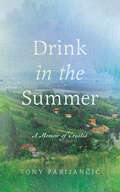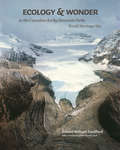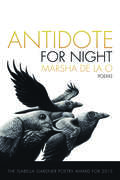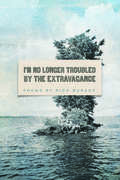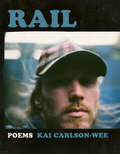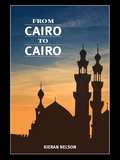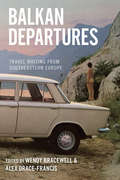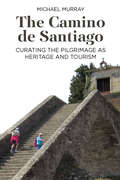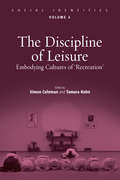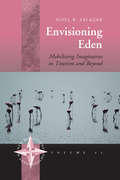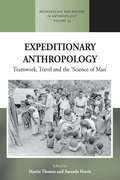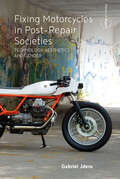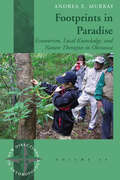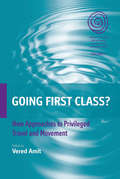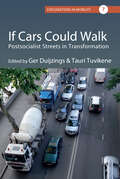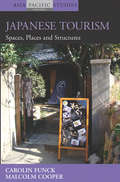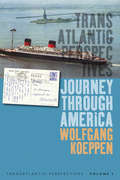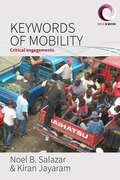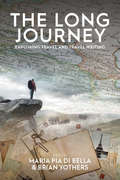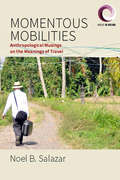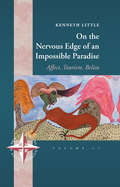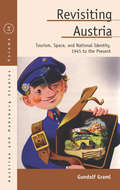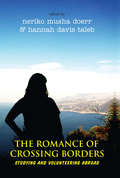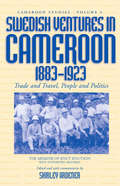- Table View
- List View
Drink in the Summer: A Memoir of Croatia (Our Lives: Diary, Memoir, and Letters)
by Tony FabijančićSince childhood, Tony Fabijančić has travelled frequently to Yugoslavia and Croatia, the homeland of his father. He spent time with his peasant family in the village of Srebrnjak in the north and escaped to the Adriatic islands in the south where he could break free from the constraints of everyday life. Those two worlds—the north, marked by the haunting saga of family life, its history and material practices, and the south, a place defined by travel and escape—formed the two halves of Fabijančić’s Croatian life. Over time, he observed Srebrnjak become a white-collar weekend retreat, the community of peasants of the 1970s, to which he was first introduced, only a distant memory. From the continental interior of green valleys and plum orchards to the austere and skeletal karst coast, Drink in the Summer is a unique record of a place and people now lost to time, a description of a country’s varied landscapes, and a journey of discovery, freedom, beauty, and love.
Antidote for Night
by Marsha de la OSet in present-day Southern California, Antidote for Night is a heartbreak lyric, a corrido, a love song to California's city lights and far-flung outskirts—the San Diego backcountry, the Central Valley, the Inland Empire, and the Mojave Desert. Marsha de la O's voice is a kind of free jazz, musically rich with LA noir and the vastness of metropolitan Southern California.Marsha de la O's Black Hope won the New Issues Prize from the University of Western Michigan and an Editor's Choice Award. She has taught Spanish-speaking children in Los Angeles and Ventura County for thirty years.
I'm No Longer Troubled by the Extravagance
by Rick BurskyI'm No Longer Troubled by the Extravagance is a collection of poems that assign new meanings to the people and things of the past. The book moves in three sections through a fantastic landscape that maps human fragility. The poems in the first section speak to matters of the heart—intimacy and loss—punctuated by lovers who leave. The second section is comprised of prose poems chronicling misadventures and conspiracies: Russian spies on Wilshire Boulevard, artichokes that mate for life, and secret photographs of God. Finally, the third section pans out from individual experience, hosting the collective in fable-like reflections. Together, the poems in Extravagance mark with fragile acceptance the surreal extravagance of being alive.The RelentlessOne day we'll know how longthe dead have to be deadbefore they feel hunger.One day it'll be summer forever.In the meantime, the weather,looking for its cue, keeps an eye on me;and I keep whatever money's in my pocketcrumpled in a ball. A relentlessresponsibility dogs me, and the funny thingis, these are the lyrics to a happy song.Go ahead, tap your foot,snap your fingers.We're roasting a pig in the yard.Rick Bursky is the author of Death Obscura (Sarabande Books, 2010) and The Soup of Something Missing (Bear Star Press, 2004), winner of the Dorothy Brunsman Poetry Prize. He lives in Los Angeles where he works in advertising and teaches poetry in the UCLA Extension Writer's Program.
Rail (A Poulin, Jr. New Poets of America #41)
by Kai Carlson-WeeSet against a landscape of rail yards and skate parks, Kai Carlson-Wee’s debut collection captures a spiritual journey of wanderlust, depression, brotherhood, and survival. These poems—a “verse novella” in documentary form—build momentum as they travel across the stark landscapes of the American West: hopping trains through dusty prairie towns, swapping stories with mystics and outlaws, skirting the edges of mountains and ridges, heading ever westward to find meaning in the remnants of a ruined Romantic ideal. Part cowboy poet, part prophet, Carlson-Wee finds beauty in the grit and kinship among strangers along the road.
From Cairo To Cairo
by Kieran NelsonWith the current international interest in the political and cultural upheaval shaking the Arab world, and the Middle East in particular, this meticulously crafted work of non-fiction introduces the reader to a world of fresh insights, helping to dissolve the many worn out cliches about the Orient.
Balkan Departures: Travel Writing from Southeastern Europe
by Wendy Bracewell Alex Drace-FrancisIn writings about travel, the Balkans appear most often as a place travelled to. Western accounts of the Balkans revel in the different and the exotic, the violent and the primitive − traits that serve (according to many commentators) as a foil to self-congratulatory definitions of the West as modern, progressive and rational. However, the Balkans have also long been travelled from. The region’s writers have given accounts of their travels in the West and elsewhere, saying something in the process about themselves and their place in the world. The analyses presented here, ranging from those of 16th-century Greek humanists to 19th-century Romanian reformers to 20th-century writers, socialists and ‘men-of-the-world’, suggest that travellers from the region have also created their own identities through their encounters with Europe. Consequently, this book challenges assumptions of Western discursive hegemony, while at the same time exploring Balkan ‘Occidentalisms’.
The Camino de Santiago: Curating the Pilgrimage as Heritage and Tourism
by Michael MurrayPilgrimage, as a global activity linked to the sacred, speaks to the special significance of persons, places and events. This book relates these sentiments to the curatorship of the Camino de Santiago that comprises a lattice of European pilgrimage itineraries converging at Santiago de Compostela in northwest Spain. The detailed analysis focuses on the management of pilgrimage settings as heritage and tourism linked to the shrine of Saint James and gives particular attention to investment guidelines, land use planning regulations, environmental stewardship, information dissemination and museology.
The Discipline Of Leisure: Embodying Cultures of 'Recreation' (Social Identities #4)
by Simon Coleman Tamara KohnThe burgeoning social scientific study of tourism has emphasized the effects of the post-industrial economy on travel and place. However, this volume takes some of these issues into a different area of leisure: the spare-time carved out by people as part of their everyday lives - time that is much more intimately juxtaposed with the pressures and influences of work life, and which often involves specific bodily practices associated with hobbies and sports. An important focus of the book is the body as a site of identity formation, experience, and disciplined recreation of the self. Contributors examine the ways rituals, sports, and forms of bodily transformation mediate between contemporary ideologies of freedom, choice and self-control.
Envisioning Eden: Mobilizing Imaginaries in Tourism and Beyond (New Directions in Anthropology #31)
by Noel B. SalazarAs tourism service standards become more homogeneous, travel destinations worldwide are conforming yet still trying to maintain, or even increase, their distinctiveness. Based on more than two years of fieldwork in Yogyakarta, Indonesia and Arusha, Tanzania, this book offers an in-depth investigation of the local-to-global dynamics of contemporary tourism. Each destination offers examples that illustrate how tour guide narratives and practices are informed by widely circulating imaginaries of the past as well as personal imaginings of the future.
Expeditionary Anthropology: Teamwork, Travel and the ''Science of Man'' (Methodology & History in Anthropology #33)
by Martin Thomas Amanda HarrisThe origins of anthropology lie in expeditionary journeys. But since the rise of immersive fieldwork, usually by a sole investigator, the older tradition of team-based social research has been largely eclipsed. Expeditionary Anthropology argues that expeditions have much to tell us about anthropologists and the people they studied. The book charts the diversity of anthropological expeditions and analyzes the often passionate arguments they provoked. Drawing on recent developments in gender studies, indigenous studies, and the history of science, the book argues that even today, the ‘science of man’ is deeply inscribed by its connections with expeditionary travel.
Fixing Motorcycles in Post-Repair Societies: Technology, Aesthetics and Gender (Politics of Repair #3)
by Gabriel JderuMost social science studies on automobility have focused on the production, usage, identity construction and aesthetic improvements of personal means of transportation. What happens if we shift the focus to the labour, knowledge and social relations that go into the unavoidable moments of maintenance and repair? Taking motorcycling in Romania as an ethnographic entry point, this book documents how bikers handle the inevitable moments of malfunction and breakdown. Using both mobile and sedentary research methods, the book describes the joys and troubles experienced by amateur mechanics, professional mechanics and untechnical men and women when fixing bikes.
Footprints in Paradise: Ecotourism, Local Knowledge, and Nature Therapies in Okinawa (New Directions in Anthropology #40)
by Andrea E. MurrayThe economic imperative of sustainable tourism development frequently shapes life on small subtropical islands. In Okinawa, ecotourism promises to provide employment for a dwindling population of rural youth while preserving the natural environment and bolstering regional pride. Footprints in Paradise explores the transformation in community and sense of place as Okinawans come to view themselves through the lens of the visiting tourist consumer, and as their language, landscapes, and wildlife are reconstituted as treasured and vulnerable resources. The rediscovery and revaluing of local ecological knowledge strengthens Okinawan or Uchinaa cultural heritage, despite the controversial presence of US military bases amidst a hegemonic Japanese state.
Going First Class?
by Vered AmitPeople travel as never before. However, anthropological research has tended to focus primarily on either labor migration or on tourism. In contrast, this collection of essays explores a diversity of circumstances and impetuses towards contemporary mobility. It ranges from expatriates to peripatetic professionals to middle class migrants in search of extended educational and career opportunities to people seeking self development through travel, either by moving after retirement or visiting educational retreats. These situations, however, converge in the significant resources, variously of finances, time, credentials or skills, which these voyagers are able to call on in embarking on their respective journeys. Accordingly, this volume seeks to tease out the scope and implications of the relatively privileged circumstances under which these voyages are being undertaken.
If Cars Could Walk: Postsocialist Streets in Transformation (Explorations in Mobility #7)
by Ger Duijzings Tauri TuvikeneIn the last twenty-five years, the explosive rise of car mobility has transformed street life in postsocialist cities. Whereas previously the social fabric of these cities ran on socialist modes of mobility, they are now overtaken by a culture of privately owned cars. If Cars Could Walk uses ethnographic cases studies documenting these changes in terms of street interaction, vehicles used, and the parameters of speed, maneuverability, and cultural and symbolic values. The altered reality of people’s movements, replacing public transport, bicycles and other former ‘socialist’ modes of mobility with privatized mobility reflect an evolving political and cultural imagination, which in turn shapes their current political reality.
Japanese Tourism
by Malcolm Cooper Carolin FunckThe changing patterns of Japanese tourism and the views of the Japanese tourist since the Meiji Restoration, in 1868, are given an in-depth historical, geographical, economic and social analysis in this book. As well as providing a case study for the purpose of investigating the changing face of global tourism from the 19th to the 21st Century, this account of Japanese tourism explores both domestic social relations and international geographical, political and economic relations, especially in the northeast Asian context. Socio-cultural and geographical analysis form the research framework for the book, in three ways: first, there is an emphasis on scale as tourism phenomena and their implications are discussed both in a global context and at the national, regional and local levels; second, the discussion is informed by primary data sources such as censuses and surveys; and third, the incorporation of fieldwork and case studies adds concreteness to the overall picture of Japanese tourism. This book is a significant addition to an area of study currently under-represented in the literature.
Journey Through America
by Michael Kimmage Wolfgang KoeppenAmerikafahrt by Wolfgang Koeppen is a masterpiece of observation, analysis, and writing, based on his 1958 trip to the United States. A major twentieth-century German writer, Koeppen presents a vivid and fascinating portrait of the US in the late 1950s: its major cities, its literary culture, its troubled race relations, its multi-culturalism and its vast loneliness, a motif drawn, in part, from Kafka's Amerika. A modernist travelogue, the text employs symbol, myth, and image, as if Koeppen sought to answer de Tocqueville's questions in the manner of Joyce and Kafka. Journey through America is also a meditation on America, intended for a German audience and mindful of the destiny of postwar Europe under many Americanizing influences.
Keywords of Mobility: Critical Engagements
by Kiran Jayaram Noel B. SalazarScholars from various disciplines have used key concepts to grasp mobilities, but as of yet, a working vocabulary of these has not been fully developed. Given this context and inspired in part by Raymond Williams' Keywords (1976), this edited volume presents contributions that critically analyze mobility-related keywords: capital, cosmopolitanism, freedom, gender, immobility, infrastructure, motility, and regime. Each chapter provides an historical context, a critical analysis of how the keyword has been used in relation to mobility, and a conclusion that proposes future usage or research.
The Long Journey: Exploring Travel and Travel Writing
by Maria Pia Di Bella and Brian YothersTravel writing has, for centuries, composed an essential historical record and wide-ranging literary form, reflecting the rich diversity of travel as a social and cultural practice, metaphorical process, and driver of globalization. This interdisciplinary volume brings together anthropologists, literary scholars, social historians, and other scholars to illuminate travel writing in all its forms. With studies ranging from colonial adventurism to the legacies of the Holocaust, The Long Journey offers a unique dual focus on experience and genre as it applies to three key realms: memory and trauma, confrontations with the Other, and the cultivation of cultural perspective.
Momentous Mobilities: Anthropological Musings on the Meanings of Travel (Worlds in Motion #4)
by Noel B. SalazarGrounded in scholarly analysis and personal reflection, and drawing on a multi-sited and multi-method research design, Momentous Mobilities disentangles the meanings attached to temporary travels and stays abroad and offers empirical evidence as well as novel theoretical arguments to develop an anthropology of mobility. Both focusing specifically on how various societies and cultures imagine and value boundary-crossing mobilities “elsewhere” and drawing heavily on his own European lifeworld, the author examines momentous travels abroad in the context of education, work, and spiritual quests and the search for a better quality of life.
On the Nervous Edge of an Impossible Paradise: Affect, Tourism, Belize (New Directions in Anthropology #45)
by Kenneth LittleThere are beastly forces in Belize. Forces that are actively involved in making paradise impossible. On the Nervous Edge of an Impossible Paradise is a collection of seven stories about local lives in the fictional village of Wallaceville. They turn rogue in the face of runaway forces that take the form and figure of a Belize beast-time, which can appear as a comic mishap, social ruin, tragic excess, or wild guesses. Inciting the affective politics of life in the region, this fable of emergence evokes the unnerving uncertainties of life in the tourist state of Belize.
On the Nervous Edge of an Impossible Paradise: Affect, Tourism, Belize (New Directions in Anthropology #45)
by Kenneth LittleThere are beastly forces in Belize. Forces that are actively involved in making paradise impossible. On the Nervous Edge of an Impossible Paradise is a collection of seven stories about local lives in the fictional village of Wallaceville. They turn rogue in the face of runaway forces that take the form and figure of a Belize beast-time, which can appear as a comic mishap, social ruin, tragic excess, or wild guesses. Inciting the affective politics of life in the region, this fable of emergence evokes the unnerving uncertainties of life in the tourist state of Belize.
Revisiting Austria: Tourism, Space, and National Identity, 1945 to the Present (Austrian and Habsburg Studies #28)
by Gundolf GramlFollowing the transformations and conflicts of the first half of the twentieth century, Austria’s emergence as an independent democracy heralded a new era of stability and prosperity for the nation. Among the new developments was mass tourism to the nation’s cities, spa towns, and wilderness areas, a phenomenon that would prove immensely influential on the development of a postwar identity. Revisiting Austria incorporates films, marketing materials, literature, and first-person accounts to explore the ways in which tourism has shaped both international and domestic perceptions of Austrian identity even as it has failed to confront the nation’s often violent and troubled history.
The Romance of Crossing Borders: Studying and Volunteering Abroad
by Neriko Musha Doerr Hannah Davis TaïebWhat draws people to study abroad or volunteer in far-off communities? Often the answer is romance – the romance of landscapes, people, languages, the very sense of border-crossing – and longing for liberation, attraction to the unknown, yearning to make a difference. This volume explores the complicated and often fraught desires to study and volunteer abroad. In doing so, the book sheds light on how affect is managed by educators and mobilized by students and volunteers themselves, and how these structures of feeling relate to broader social and economic forces.
Swedish Ventures in Cameroon, 1883-1923: Trade and Travel, People and Politics (Cameroon Studies #4)
by Shirley ArdenerThe 1880s were a critical time in Cameroon. A German warship arrived in the Douala estuary and proclaimed Cameroon a protectorate. At that time, two Swedes, Knutson and Waldau, were living on the upper slopes of the Cameroon Mountain. Very little is known about their activities. One, Knutson, wrote a long memoir of his time in Cameroon (1883-1895) which is published here for the first time. It gives fascinating insights into everyday life in Cameroon and into the multifaceted relationships among the various Europeans, and between them and the Africans, at the end of the 19th century; we learn about the Swedes' quarrels first with the Germans and later with the British, over land purchases, thus revealing the origins of long on-going disputes over Bakweri lands. We are given vivid descriptions of Bakweri notables and their, and the Europeans', cultural practices, a rare eye-witness account of the sasswood witchcraft ordeal, and learn about Knutson's friendships with slaves. Together with appended contemporary correspondence, legal opinions, and early (translated) texts, this memoir must be considered as a unique and invaluable primary source for the pre-colonial history of Cameroon.
